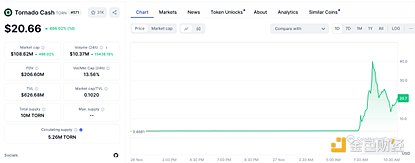
Author: Revc, Golden Finance
On November 26, the U.S. Court of Appeals for the Fifth Circuit overturned the sanctions against Tornado Cash. Affected by this news, the price of Tornado Cash token TORN has gone past 24 It soared 486.02% in an hour, with a trading volume of nearly 10 million US dollars, and a 24-hour increase of 15438.18%.
In recent years, with the rapid development of blockchain technology and cryptocurrency, the contradiction between privacy and supervision has become increasingly prominent. In this game, cryptocurrency mixer Tornado Cash has become one of the important targets in the United States’ fight against illegal activities. However, the controversy over the sanctions against Tornado Cash is not only about privacy protection, but also involves the boundaries of administrative power and legal interpretation.
Crypto Mixers and Privacy ChallengesCryptocurrencies are known for their open and transparent transaction characteristics, and anyone with technical knowledge can track the flow of funds through the blockchain. However, this publicity also brings privacy risks. Violent crimes, hacker attacks, and malicious actions targeting sensitive transactions are commonplace, making users' demand for privacy even more urgent. For this reason, cryptocurrency mixers come into being.
Tornado Cash is a hybrid service based on the Ethereum blockchain that anonymizes transactions through smart contract technology. However, this privacy protection tool not only attracts legitimate users, but also becomes a tool for criminals and hackers to launder funds. According to charges from the U.S. Treasury Department’s Office of Foreign Assets Control (OFAC), approximately $7 billion in cryptocurrency has flowed through Tornado Cash since its inception in 2019, some of which was related to criminal activity.
Legal Controversy over OFAC SanctionsIn 2022, OFAC announced sanctions against Tornado Cash, banning U.S. citizens from participating in its transactions. The sanction has raised important legal disputes over whether executive power has overstepped its bounds. Under the International Emergency Economic Powers Act (IEEPA), the President and the agencies he authorizes can freeze the property and property interests of foreign entities. However, whether the nature of Tornado Cash met this definition became central to the case.
In multiple lawsuits, plaintiffs have argued that Tornado Cash’s core technology—immutable smart contracts—is open source software code, not an entity or person, and therefore does not constitute “property” that can be sanctioned. . In addition, the lawsuit also proposed that OFAC’s expansive interpretation may lead to unrestricted expansion of administrative power, posing a threat to personal privacy, open source development and legal transactions.
Landmark Significance of the Court’s RulingThe Fifth Circuit Court of Appeals ruled that Tornado Cash’s smart contract is not the “property of a foreign country or entity” and that its immutable nature excludes it from the jurisdiction of the IEEPA. This ruling marksThe question of where the boundaries of power in dealing with new technologies is made clear by the judicial system.
The court pointed out that although smart contract technology may bring adverse consequences, legislation should be led by Congress. Rather than solving technical problems through the expansionary interpretation of administrative agencies. Tornado Cash’s native token, TORN, surged in the market following the ruling, showing the crypto community’s positive response to the verdict.
The future balance of regulation and privacy
Despite court ruling for Tornado Cash temporarily With the victory won, the case was not closed. There may still be other legal avenues to hold the platform accountable, while its developers still face legal challenges. Recently, Tornado Cash developer Alexey Pertsev was convicted of money laundering and faces up to 5 years in prison, further highlighting the tension between regulators and open source developers.
The importance of this ruling lies not only in its direct impact on Tornado Cash, but also in its far-reaching significance for the entire encryption industry, the open source technology community, and privacy protection. As a landmark case in the field of DeFi (decentralized finance), the Tornado Cash case will become an important reference in the development of future regulation and privacy technology.
SummaryThe Tornado Cash case reveals the complexity of regulators dealing with emerging technologies. The balance between privacy protection and security requires a more detailed and clear legal framework rather than relying on the expansion of administrative power. Congress should play a more active role in formulating regulations that adapt to technological changes and avoid excessive enforcement or privacy violations caused by regulatory vacuums.
For the encryption industry, this ruling strengthens the importance of privacy protection and also reminds practitioners to pay attention to the integration of technology and law. Tornado Cash still faces legal challenges such as money laundering and financial stability, and investors should be aware of related risks.
Privacy is a right, not a crime. In an era of constant technological innovation, the challenge of balancing privacy and regulation has only just begun.











